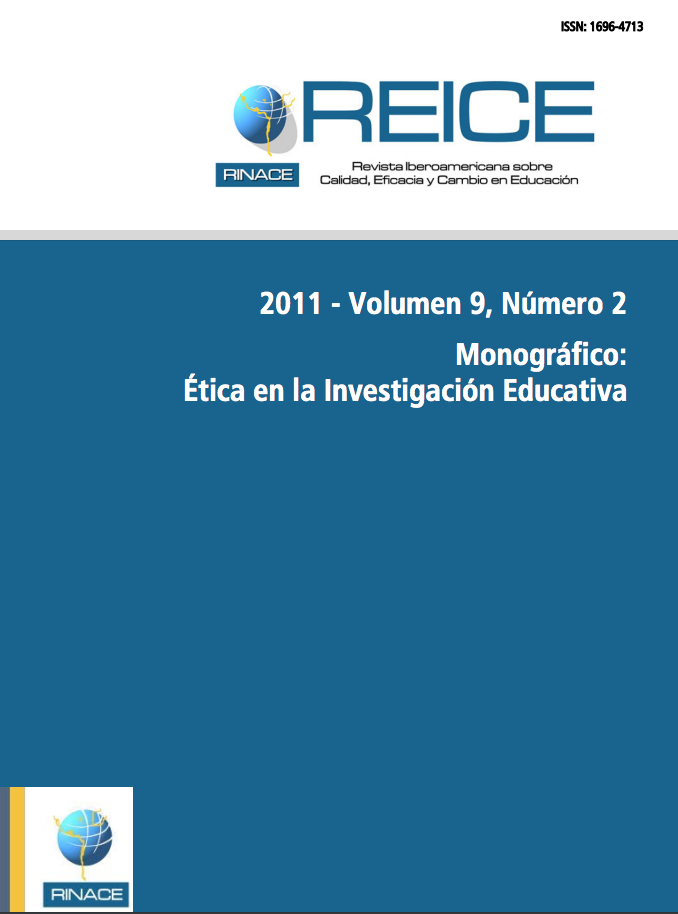Ethics in Educational Research and the Risk of the Use of Social Science as Naturalization
Keywords:
Ethics, educational research, symbolic violence, education, science, societyCopyright (c) 2023 REICE. Revista Iberoamericana sobre Calidad, Eficacia y Cambio en Educación

This work is licensed under a Creative Commons Attribution-NonCommercial-NoDerivatives 4.0 International License.
Abstract
This article brings to discussion, one of the key elements to analyze the ethical dimension of educational research. This is the use of science, as a discourse that contributes to the naturalization of the social, as a mechanism of imposition for the cultural arbitraries (Bourdieu, 1990). After traveling through a couple of examples, the use given to the scientific discourse in social communication mass media, the article delves into discussions on the relationship between science and society, to then focus on the analysis of the form in which the processes based on naturalization, impose certain cultural contents through the symbolic violence (Bourdieu, 1990). Later on this mechanism is presented, in relation to education and its consequences. To finally address the issue of ethical commitment, from the understanding of the scientific production, as a way of revealing what the naturalization hides and make it available to the whole community, the unhiding, in order that communities can freely build their destinies.
Downloads
References
Bernal, J. (1986). Historia social de la ciencia. La Habana: Ciencias Sociales.
Bourdieu, P., y Passeron, J.C. (1981). La reproducción. Barcelona: Laia.
Bourdieu, P., y Passeron, J.C. (2001). La reproducción: Elementos para una teoría del sistema de enseñanza. Madrid: Popular.
Caballero, J., Kaplan, C. y Vain, P. (2007). Pedagogía. Textos y contextos. Posadas: Editorial Universitaria.
Flaschsland, C. (2005). Pierre Bourdieu y el capital simbólico. Buenos Aires: Campo de Ideas.
Foucault, M. (1990). Diálogos sobre el poder. Buenos Aires: Alianza.
Galeano, E. (1998). Patas arriba. La escuela del mundo al revés. Buenos Aires: Siglo XXI.
Geertz, C. (1963) Old societies and new states. The quest for modernity in Asia and Africa. New York: The Free Press.
Gutiérrez, A. (1995). Pierre Bourdieu. Las prácticas sociales. Posadas: Editorial Universitaria.
Llobera, J. (1980). Hacia una historia de las ciencias sociales. Barcelona: Anagrama.
Milgram, S. (2005). Los peligros de la obediencia. Polis, Revista de la Universidad Bolivariana. Caracas.
RAE (2001). Diccionario de la lengua española. Vigésima segunda edición. Madrid: RAE.
Rodríguez, M. (2006). El asesoramiento comunitario y la reinvención del profesorado. Revista de Educación, 339. Madrid: Ministerio de Educación.
Scavino, D. (1999). La era de la desolación. Ética y moral en la Argentina de fin de siglo. Buenos Aires: Manantial.
Vain, P. (1997). Los rituales escolares y las prácticas educativas. Posadas: Editorial Universitaria.
Vain, P. (2007). ¿Y si el alumno no estuviera allí? Una mirada acerca del rol docente universitario, desde las prácticas de la enseñanza en entornos no presenciales. Universidad de Málaga. Tesis Doctoral (Inédito).
